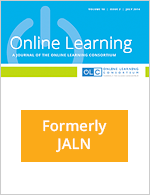Requirements-Driven ALN Course Design, Development, Delivery & Evaluation
The best path to effective asynchronous learning network (ALN)-based course design, delivery and evaluation is through a requirements-driven methodology that recognizes the uniqueness of ALN-based learning. The methodology calls for the identification of purposeful and functional requirements, the identification of pre-course, early-course, mid-course and end-course activities, course "packaging" and prototyping,...

